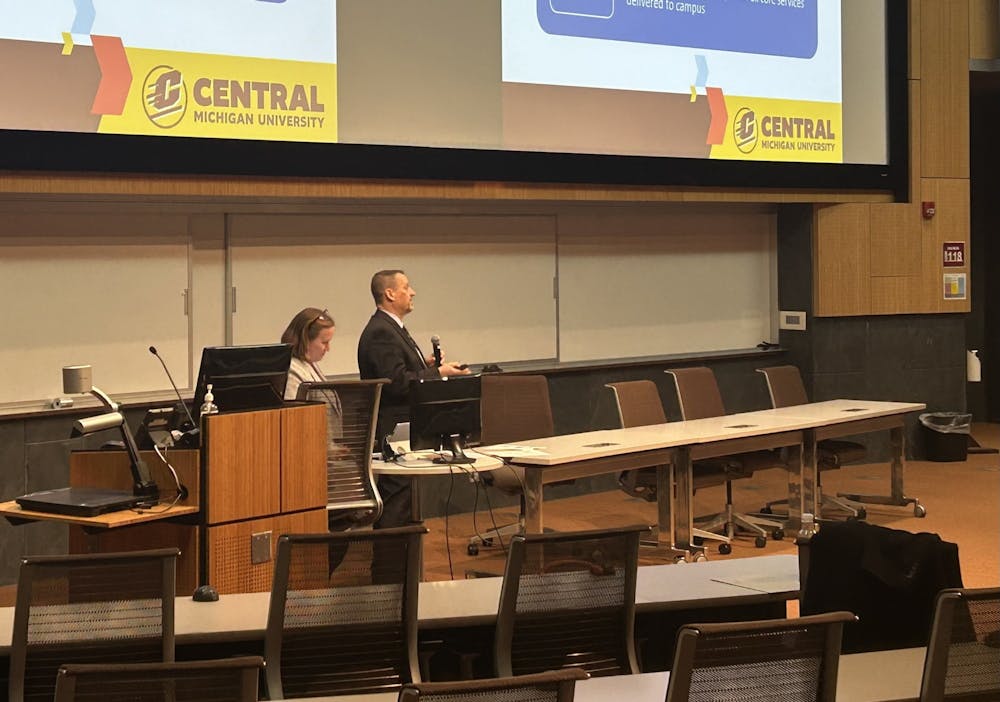Academic Senate discusses verification of non-participation
Students who do not meet federal participation requirements could be dropped from classes and lose financial aid

The Academic Senate’s April 4 meeting started off smoothly, moving along with no questions or objections. That changed after Sarah Kasabian-Larson and Keith Malkowski gave their presentation on verification of non-participation.
The presentation focused on a change that will be coming to Central Michigan University during this summer. On the Friday of the second week of class, instructors will be sent a form that will require them to mark if a student is meeting the participation standards set by the federal government. This is so Title IV funds can be verified quicker and determine students’ eligibility for financial aid.
The summer semester was chosen as a “testing ground” because there are less students in attendance at CMU and they will be able to fix problems as they arise.
According to the federal government, examples of participation include:
· Attending asynchronous class, lecture – physical or online – where there is opportunity for interaction between the instructor and students;
· Handing in homework;
· Taking a quiz or exam;
· Posting information or blog entries/comments on a web platform;
· Any other activity that demonstrates engagement in the course; and
· Participating in group projects or a study group.
If a professor marks that a student does not meet these standards, they will be automatically dropped from the class after week two and will lose their federal financial aid for that course. Currently, non-participation is not verified until after the term is over.
This process stays the same for all course types and lengths. An 8-week-long course will have the same requirement as one that might last 16 weeks, and an online course will have the same requirements as an in-person class.
According to Malkowski and Kasabian-Larson, this is being pushed by the federal government and they are just there to enforce it. There are currently monthly enrollment reports being sent to the federal department of education, and there are hopes that these changes can make those reports more accurate.
Malkowski said that the week two deadline was chosen because they wanted to find a sweet spot between the add/drop period and when they send in their enrollment reports.
Kasabian-Larson emphasized that this is not about making attendance mandatory.
“Per federal regulations a Title IV-eligible institution needs to determine if the student began participation in their courses,” Kasabian-Larson said. “We will not be an attendance-taking school, it is just merely locking in aid and making sure the student began participation in the course.”
Kasabian-Larson said that this helps the financial aid office determine what students qualify for and helps them with accurate and timely disbursement of funds. Currently, students can receive aid at the beginning of a semester, but if they are deemed to have been a non-participant later on, they can be charged for those funds months later.
“Our current way of doing business is really putting us at risk,” Malkowski said.
There were many concerns brought up during the meeting, many of which pertained to the responsibilities of faculty and the effect that this might have on students. Numerous members were concerned with the scenario of a student showing up in the third week, after they already have been marked as a non-participant and dropped from the class.
Other concerns were about larger classes that do not take attendance and do not normally have assignments due within the first two weeks of class. Others worried about night classes that only meet on Mondays. CMU normally closes the second Monday each semester, in observance of Martin Luther King Jr. Day and Labor Day, respectfully.
A proposed answer to these concerns was to make something small on Blackboard, such as a one question quiz, so that students could prove their participation.
The Academic Senate meets 3:30 to 5 p.m. bi-weekly on Tuesdays in the French Auditorium, located in the Education and Human Services building. For meeting livestreams and recordings, visit the Academic Senate website.






